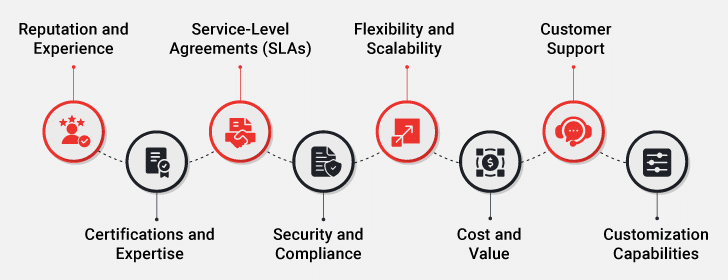Salesforce provides extensive feature sets to help companies manage their client interactions, optimize workflows, and boost expansion. Effective Salesforce management, however, requires specific training and experience. Salesforce managed services are useful in such a scenario. Businesses can ensure their Salesforce environment is safe and aligned with their strategic objectives by working with a managed service partner (MSP). This blog will discuss key considerations required when choosing and collaborating with a Salesforce managed services partner. The resultant insights will help you overcome the complexities of Salesforce managed services, whether you’re looking to optimize your current Salesforce instance or starting out fresh.

Understanding Salesforce Managed Services
A wide range of tasks intended to maintain, support, and improve your Salesforce environment are included in Salesforce managed services. These services often range from regular support and maintenance to strategic consultation and custom development. Ensuring your Salesforce platform runs effectively and continues to meet your business goals is the main purpose behind these services. This generally requires proactive monitoring, timely updates, and quick resolution of any problems that arise. Thus, businesses can prevent downtime and achieve high levels of customer satisfaction and productivity. Furthermore, managed services may assist in revealing hidden potential for innovation and growth, ensuring your Salesforce environment adapts to the changing requirements of your company.
Typical services provided by Salesforce MSPs include the following:
- Maintenance and Support: Regular updates, user support, and troubleshooting
- Custom Development: Custom-fit solutions to fulfill specific company requirements
- Strategic Consulting: Advice on implementing Salesforce to achieve your company goals
These services help companies in making the most of Salesforce’s instance and ensure that the platform is customized to match unique business needs. As a result, businesses gain from rich consumer insights, more productivity, and better performance. Businesses are also able to implement best practices faster and stay ahead of industry trends by utilizing an MSP’s experience.
A Beginner’s Guide to Salesforce CRM Managed Services: What You Need to Know
8 Key Considerations for Selecting a Salesforce MSP

1. Reputation and Experience
Reputation and experience are important factors to consider when choosing an MSP. Find an MSP who has a good track record and satisfied clients. Assess their knowledge of your particular industry along with their Salesforce experience. A credible MSP will have references and case studies that show their track record of success.
Examining the MSP’s industry awards and recognitions is also helpful because these may highlight their dedication to quality work and client satisfaction. Consider the MSP’s track record in the industry as well as their capability to adjust to newer business challenges and technology shifts.
2. Certifications and Expertise
A critical indicator of an MSP’s experience is the number of their Salesforce certifications. Carefully verify that the MSP employs qualified experts such as developers, architects, and Salesforce administrators. Make sure the MSP is knowledgeable about various Salesforce clouds and products your company employs, such as Marketing Cloud, Service Cloud, or Sales Cloud. This ensures that the MSP can offer customized support and solutions that are suited to your company requirements. Additionally, a multi-skilled MSP may provide innovative solutions and smoothly integrate Salesforce with other business systems.
3. Service-Level Agreements (SLAs)
SLAs are essential for establishing each party’s obligations and expectations. Performance metrics, uptime guarantees, and response times are basic elements of all SLAs. Make sure the MSP provides SLAs that meet your company’s requirements and offer precise instructions for service delivery and accountability.
By closely examining SLAs, you can make sure that there are systems in place to handle any potential problems and you have a better understanding of the quality of service to be delivered. Ensure the outcomes of SLA violations are discussed, and clear escalation channels are set up for quickly resolving unplanned conflicts.
4. Security and Compliance
When collaborating with a Salesforce managed services partner, data security is crucial. Verify that the MSP follows industry rules and standards, including GDPR and HIPAA, and employs best practices for data security. Get familiar with their compliance certifications, data encryption techniques, and security procedures.
To properly protect your data, it’s also critical to make sure the MSP performs frequent security assessments and keeps abreast of the latest security trends and legislations. Also remember to evaluate the MSP’s background in managing confidential information as well as their capability to put together strong business continuity and disaster recovery plans.
5. Flexibility and Scalability
Your business needs will evolve over time, and it’s important to choose an MSP that can scale their services accordingly. Look for an MSP that offers flexible services and contract terms. This flexibility will allow you to adjust the scope of services as your business grows and changes.
An MSP that can scale its services to match your evolving needs will help you maintain operational efficiency and support your business growth without interruption. In addition, such services can adapt to seasonal demand fluctuations, quickly adjusting to sudden market changes or new business opportunities.
6. Cost and Value
Scrutinize the cost efficiencies of your MSP’s services. Understand their pricing structure (fixed, variable, or hybrid) and evaluate the total value they offer to their customers. Carefully consider the quality of the service and the possible return on investment in addition to the price factor.
You can easily determine whether the MSP’s services are cost-effective and improve your bottom line by simply doing a thorough cost-benefit analysis. The long-term advantages of working with an MSP, such as better productivity, minimum downtime, and higher customer satisfaction, should also be considered.
7. Customer Support
A lasting partnership with the MSP can only be established on the basis of effective customer service. Make sure the MSP has dedicated account managers to service your immediate and ongoing requirements. The disruption-free operation of your Salesforce environment can be negatively impacted in the absence of a committed support desk.
To ensure you can get assistance whenever you need it, look for an MSP that provides various support channels, including phone, email, and live chat on a 24X7 basis. Remember to evaluate the MSP’s response times as well as their capacity to offer proactive support, including routine system health checks and performance enhancements, much before the rise of potential problems.
8. Customization Capabilities
Every company has different requirements; therefore, it’s critical to pick an MSP who can customize solutions to fit those needs. Make sure the MSP can tailor Salesforce solutions to meet your unique needs and operational workflows.
This can involve development of custom-made apps, integration of third-party frameworks and tools, and setting up Salesforce instance to fit your specific business requirements. Always ask for relevant case studies from the MSP that support their Salesforce customization capabilities.
Best Practices for Working Effectively with a Salesforce MSP
1. Establishing Clear Communication Channels
For a collaboration with MSP to succeed, communication must be frequent and clear. Right from the start, establish a communication frequency and designate points of contact. Frequent meetings and updates will ensure that everyone is aware of role-based expectations and common business objectives.
Effective communication leads to result-oriented collaboration and thus helps to establish confidence and a sense of purpose among participating entities. In addition, to promote real-time communication and sharing of information, think about utilizing advanced collaboration tools and platforms.
2. Defining Roles and Responsibilities
Clearly state each party’s roles and responsibilities. This involves setting the tasks and long-term goals for your internal team and the MSP. Collaboration will go more smoothly, and misunderstandings can be avoided by making sure that expectations and goals are in line.
The roles and responsibilities of project teams should be clearly defined in order to avoid duplication of efforts and to ensure each job is done properly and efficiently. Clarity of purpose and accountability can be maintained throughout the working relationship by periodically reviewing and adjusting roles and responsibilities as needed.
3. Setting Clear KPIs
KPIs (key performance indicators) should be specific, measurable, achievable, relevant, and time-bound (SMART) to provide a clear framework for evaluating the MSP’s performance. Carefully define and establish team KPIs to measure the success of the partnership, ensuring these are aligned with your business goals.
Regularly reviewing KPIs and adjusting them basis changing business demands can ensure continuous improvement and alignment with your goals.
4. Ongoing Monitoring and Evaluation
Make sure the MSP is meeting your set expectations by routinely assessing their performance. Such regular business reviews are essential to identify areas of improvement. If necessary, modify the scope of services to maintain alignment with your business needs. Consider using reporting dashboards to monitor key performance indicators and getting real-time business insights.
5. Collaboration and Partnership
For long-term success, you and your MSP must develop a collaborative alliance. Promote information exchange and ongoing development. To accomplish your business objectives, treat the MSP as a strategic partner as opposed to merely a service provider.
A collaborative approach encourages innovation and continual improvement, which benefits both sides. Frequent brainstorming meetings and joint planning sessions can drive success for both parties and uncover new business opportunities.
Accelerate growth with Salesforce
6. Training and Support
Make sure your internal team gets the required training opportunities to be able to use the Salesforce platform efficiently. Make sure the MSP provides enough resources and assistance to support the success of your team. This should cover continuing support, documentation, and user training.
Guided learning paths, advance workshops, and expert-led sessions for your staff will ensure they’re able to use Salesforce efficiently, utilizing all its features and capabilities and are abreast of the most recent advancements in Salesforce.
Speed Up Your Salesforce Implementation for Lasting Outcomes.
Comparison Between In-House Management and Using an MSP
Although some companies might favor internal Salesforce management, this strategy can be resource-intensive and might not offer the same degree of experience as an MSP. Internal teams frequently find it difficult to keep up with Salesforce’s quick innovations and changes. MSPs, on the other hand, are committed to keeping up with Salesforce advancements, ensuring that your platform stays state-of-the-art. As the MSP manages the intricacies of Salesforce administration, your internal team may concentrate on essential business operations. Furthermore, MSPs can give you access to more resources and a wider spectrum of knowledge than an internal team, which can improve your results.
Key Benefits of Using a Salesforce MSP
- Cost Savings: Outsourcing Salesforce management to an MSP can be more cost-effective than maintaining an in-house team. MSPs offer flexible pricing models that can be tailored to your budget and needs. This can lead to significant cost savings compared to hiring and maintaining an in-house team with the same level of expertise. Additionally, MSPs can help you avoid costly mistakes and inefficiencies by providing expert guidance and support.
- Access to Expertise: MSPs bring a wealth of experience and specialized knowledge. They stay up to date with the latest Salesforce features and best practices, ensuring your platform is always optimized. This expertise can help you implement best practices and innovative solutions that drive business growth and efficiency. MSPs can also provide valuable insights and recommendations based on their experience with other clients and industries.
- Scalability: As your business grows, your Salesforce needs will evolve. MSPs can scale their services to match your changing requirements, providing the flexibility you need to stay agile. This scalability ensures that your Salesforce environment can grow and adapt alongside your business, supporting long-term success. MSPs can also help you quickly respond to new opportunities and challenges by providing the necessary resources and expertise.
Success Stories
Case Study 1: Improved Operational Efficiency
A leading US manufacturer struggled with inefficient dealer management processes and high operational costs. By partnering with a Salesforce managed services provider, they were able to streamline their operations and reduce turnaround time for deliveries. The MSP provided custom Salesforce development and strategic consulting, resulting in a 40% increase in efficiency and significant cost savings.
Case Study 2: Enhanced Productivity and Client Satisfaction
A major US wealth management company faced challenges with manual client information management, including poor data quality, data integrity, and security issues. The MSP implemented mobile Salesforce to boost advisor productivity via 360-degree client views, robust security protocols, and thorough cleanup of client records.
Case Study 3: Reduced Sales Cycle and Maximized Deal Size
A large Japanese manufacturer of metrological tech and precision measuring equipment struggled with complexities around the end-to-end quote generation process and disjointed ERP and sales applications. The MSP provided a unified sales platform for a quick quote-to-cash process for their 2000+ products. This helped them achieve shorter sales cycles while maximizing deal sizes.
Pitfalls to Avoid When Working with a Salesforce MSP
A) Lack of Clear Communication
One of the most common pitfalls is the lack of clear communication. Establishing clear communication channels from the start is essential. Regular updates and meetings will ensure both parties are aligned, and any issues are addressed promptly.
B) Unclear Expectations and Goals
Setting clear, measurable goals and expectations is crucial for a successful partnership. Ensure both parties are aligned on the objectives and regularly review and adjust these goals as needed.
C) Ignoring SLAs and Performance Metrics
Understanding and monitoring SLAs is critical. Regularly review performance metrics to ensure the MSP is meeting their commitments. Address any issues promptly to avoid disruptions to your business operations.
D) Overlooking Security and Compliance
Data security and compliance should never be overlooked. Ensure the MSP follows best practices for data security and conducts regular audits and compliance checks. This will help protect your business from potential security breaches and regulatory fines.
E) Failure to Collaborate
Building a collaborative relationship with your MSP is essential for long-term success. Encourage knowledge sharing and continuous improvement. Treat the MSP as a strategic partner rather than just a service provider and work together to achieve your business goals.
Summing Up
Your business may be greatly impacted by the strategic choice you make when choosing and collaborating with a Salesforce managed services partner. You may select the best MSP for your requirements by considering elements like pricing, customer support, security, flexibility, reputation, experience, SLAs, and customer service. A successful partnership will be a natural outcome when you foster a collaborative relationship and steer clear of typical pitfalls. To improve outcomes and advance your business, take the time to assess your present MSP or think about bringing on a new partner.





